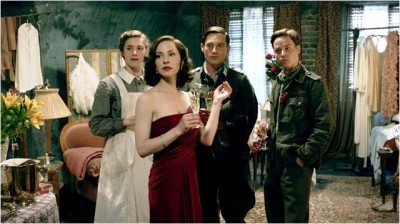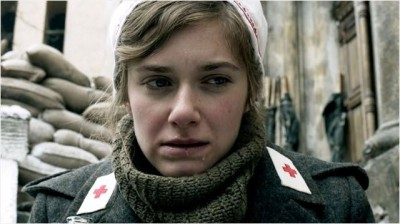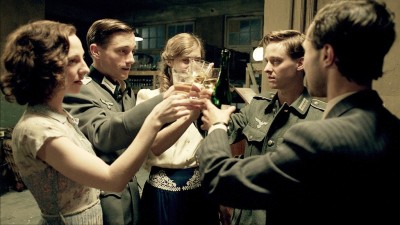
Philipp Kadelbach’s Generation War started out as an immensely popular three-part German TV series, but it comes to us as slightly more than 4 1/2 hours of feature film. The runtime is split into two parts titled, Our Mothers and Our Fathers. (It is unknown at this point whether each part requires separate admission.) The TV film was originally called Our Mothers, Our Fathers — the idea being that from a German perspective, the characters in the film represent just that. (More properly, they might be grandparents or even great grandparents by this point.) It is an attempt to come to grips with the fact that, yes, their forebears fought for the Nazis — were Nazis — during World War II. This, of course, is tricky ground to traverse, and some have called the film a whitewash job that deliberately sidesteps some of the thornier issues. Does it? That was not the impression I got, but it has to be remembered that the film is looking at the war through the eyes of its main characters, and it must be judged from that perspective. To me, it has less to do with making the Germans look good than it’s about the perils of nationalism for its own sake, self-delusion, disillusionment and just plain getting sucked into something over which you have no control.

The story follows five young friends — hero-material Wilhelm Winter (Volker Bruch), his sensitive, poetic brother Friedhelm (Tom Schilling), soon-to-be field nurse Charlotte (Miriam Stein), would-be chanteuse Greta (Katharina Schüttler) and her Jewish boyfriend Viktor Goldstein (Ludwig Trepte) — from the beginning of the war to a bit past its ending. At the onset, they are naive — expecting the war to be over by Christmas. Even Viktor thinks little of what is to come. We know, of course, that it won’t be over by Christmas. The only one who has any grasp on this is Friedhelm, who correctly prophesizes that all war will do is bring out the worst in them all. The five friends will not all emerge from this alive, and those who survive will be changed, compromised, tarnished and disillusioned by the experience.

The plot — which is probably the most compelling aspect of the film — is way too complicated to try to reproduce here, even if such was desirable. It’s not that the plot is exactly fresh (large chunks of it might be from any number of war movies) or entirely believable (writer Stefan Kolditz is very fond of the convenient coincidence, especially as concerns chance encounters), but that doesn’t keep it from becoming engrossing over its considerable length. Some of it is decidedly on the soapy side, but that’s not entirely a bad thing, nor does it detract from the drama of the situations. It helps that most — though by no means all — of the characters’ actions make sense within the confines of their situations. Charlotte’s actions are sometimes hard to fathom, and Friedhelm’s character feels underdeveloped, but there’s so much going on that it manages to get by. The fact that most of the film takes place on the Eastern Front was probably wise from the standpoint of western audiences, though I doubt that was the intent. After all, if you want to show German disillusionment with the “final victory,” Russia is the place to do it.

The filmmaking, on the other hand, is mostly workmanlike, despite the fact that the production values are first-rate. Kadelbach relies far too heavily on the “excitement” of hand-held camerawork, and even more on post-production manipulation of the images to halt movement. It’s not bad, but it’s certainly on the clichéd side (and once the fad dies, it will date horribly). However, he does handle the performers well, and he keeps the massive story moving. The result is not a great film — even though it clearly wants to be one — but it is an involving film that feels like a seven course meal by its sheer size. Not Rated, but decidedly not for children in its themes, intensity and often bloody violence.
Playing at Carolina Cinemas.





Before you comment
The comments section is here to provide a platform for civil dialogue on the issues we face together as a local community. Xpress is committed to offering this platform for all voices, but when the tone of the discussion gets nasty or strays off topic, we believe many people choose not to participate. Xpress editors are determined to moderate comments to ensure a constructive interchange is maintained. All comments judged not to be in keeping with the spirit of civil discourse will be removed and repeat violators will be banned. See here for our terms of service. Thank you for being part of this effort to promote respectful discussion.